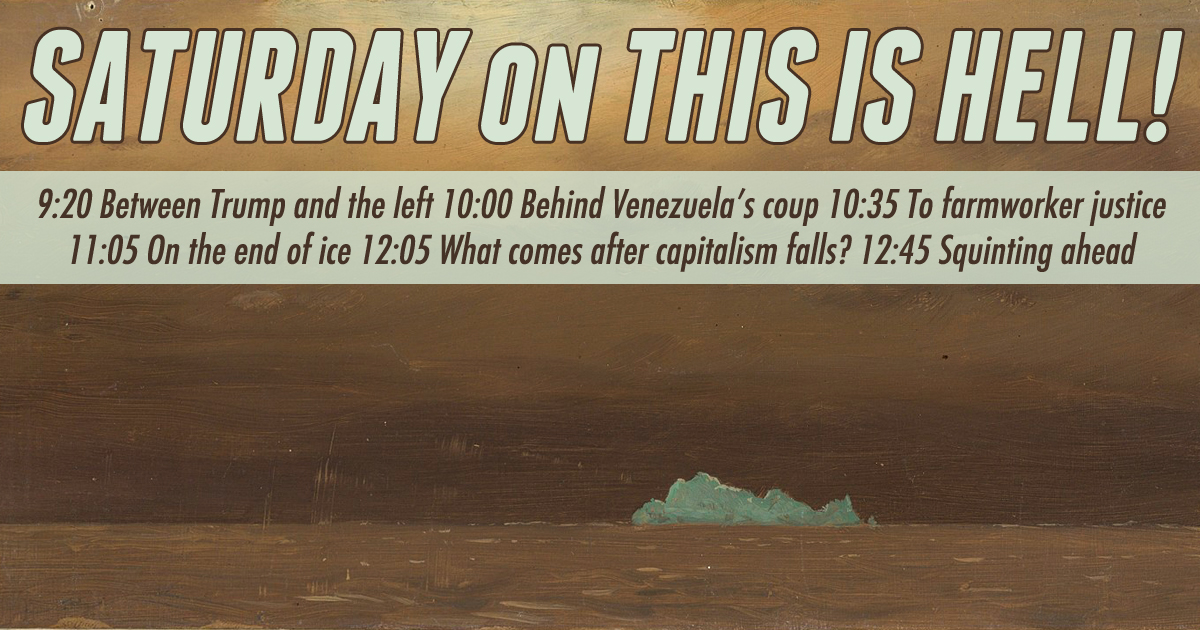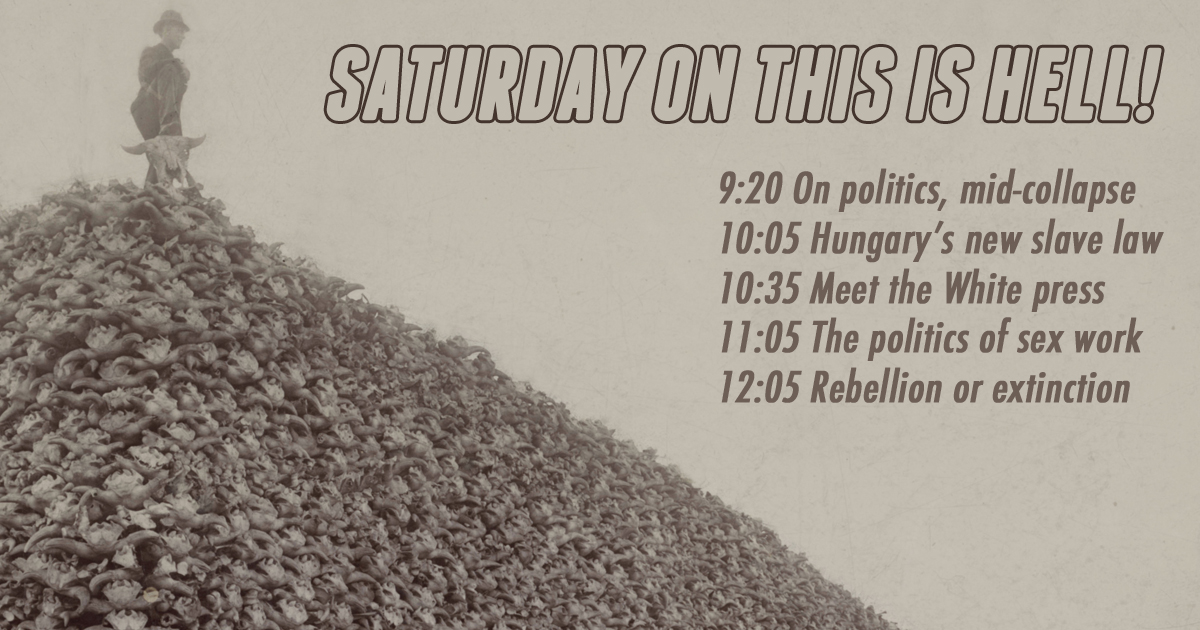
Séamus Malekafzali returns to discuss his recent piece at The Nation, "The Assassination That Paved the Way for Trump’s Venezuela Attack: How Trump’s illegal 2020 killing of Qassem Soleimani—and the West’s indifferent response—laid the groundwork for the brazen abduction of Nicolás Maduro." "The Moment of Truth" with Jeff Dorchen follows the interview.
Help keep This Is Hell! completely listener supported and access bonus episodes by subscribing to our Patreon.
Please rate and review This Is Hell! wherever you get your podcasts. It really helps the show ascend the algorithm to reach new... read more
Coroners Complicit in Obscuring Violent Deaths in State Custody / Terence Keel
Welcome to the Moment of Truth: the thirst that is the drink.
The object of any capitalist enterprise seems to be to contrive, through law or violence, to control the greatest amount of resources possible, and to increase such control even beyond time and the possible. There is no point at which the capitalist enterprise is programmed to decide enough is enough. The resources it seeks to command include what we normally think of as wealth or capital, such as raw materials, space, time, and money, as well as physical human beings, where they are in space and how they exert their energy at any given time, but also including their ineffable attributes: loyalty, passion, purpose, wishes, sexual feelings, determination, perseverance, language, ignorance, knowledge, imagination, anxiety, pettiness, preference, and any number of other intangible energies, to which a name may or may not be attached.
Does capitalism succeed in its quest for control? Yes it does. What can put the breaks on its quest? Unions, the power of which has been waning since and partially because of the Reagan administration; government, which has been known to vacillate between bowing to the influence of the people and to that of capital, with capital in the excessively ascendant currently; and natural forces, although any limit imposed by so-called "nature" is often turned by capital into yet another opportunity or public excuse to exert other kinds of control.
All limits are just more business opportunities. Is the world crumbling due to fossil fuel emissions? Here's a battery! The concerned consumer never sees the emissions produced during lithium extraction, battery manufacture, and generating the electricity used to charge the batteries, all of which activities occur "off-camera."
Are unions forcing you to raise wages? There's a company you can hire to undermine labor solidarity. There are all kinds of lobbyists hired to convince governments to hire the capitalist to remove obstacles to capitalism, and think tanks to advise governments to listen to those lobbyists. It's big business, removing obstacles to business, and everyone wants in on that gravy train. It's a viciously circular feeding frenzy, and the great masses of us outside of uber-wealth are the bait ball.
The ability to profit from our emotions, both petty and grand, and the ability to turn catastrophe and human misery into investment opportunities, seem to be the two aspects of... read more
In 1700 – (319 years ago) — the Pacific Northwest area of North America was ripped by a massive 9.2 earthquake along a fault stretching some six hundred miles from Vancouver Island to what is now northern California. Although no direct records of the quake exist from that time, scientists have deduced its time and intensity from detailed records of a tsunami that struck the east coast of Japan shortly afterward. Further evidence of the cataclysm was also preserved in growth rings in trees, and is also found in the oral traditions of local Native American and First Nations people, which tell of an apocalyptic blast that struck without warning on a winter’s night, accompanied by floods and landslides that buried entire villages and swept people into the sea, never to be heard from again. Scientists have uncovered other clues suggesting that earthquakes in that region have occurred in a cycle of roughly once every three to five hundred years. In some estimates, they suggest a 37 percent chance of another major quake occurring in that area within the next fifty years.
In 1856 – (163 years ago) — fed up after months of chaotic battle with white settlers in what became known as the Puget Sound War, a force of several hundred Native Americans attacked a white settlement located on a small peninsula at Seattle. In their armed response, the settlers were quickly supported by Marines from the USS Decatur, a Navy ship anchored just offshore. The battle lasted all day, and it ended with at least twenty-eight Native Americans dead, eighty wounded, and the rest demoralized in retreat. The whites, meanwhile, had suffered only two deaths, and would go on maintain and reinforce their hold on the peninsula.
In 1977 – (42 years ago) — former vice president, presidential candidate, and New York governor Nelson Rockefeller died of a heart attack. The first news reports of his death claimed that he had been found slumped over the desk in his office. But contradictions quickly appeared in the official story, and it soon turned out that in fact Rockefeller had met his end while alone in a Manhattan townhouse with a twenty-five-year-old woman who worked for him, and whom he had helped to purchase a condo. While Rockefeller’s family struggled to deny rumors of an illicit sexual affair, the incident quickly became the subject of jokes on late-night television.
Rotten History is... read more

Listen live from 9AM - 1:00PM Central on WNUR 89.3FM / stream at www.thisishell.com / subscribe to the podcast
9:20 - Writer Nicole Aschoff examines the left's new (old) challenges in the Trump era.
Nicole wrote the paper America’s Tipping Point? Between Trumpism and a New Left for Socialist Register.
10:00 - Writer Jorge Martin exposes the imperialist hand in the Venezuelan coup attempt.
Jorge wrote the article Washington Moves Towards 'Regime Change' in Venezuela for Venezuelanalysis.
10:35 - Writer Olivia Heffernan reports on the work of building a farmworker labor movement.
Olivia wrote the article Are we prepared to pay the price for farmworker justice? for openDemocracy.
11:05 - Journalist Dahr Jamail explores grief, love and wilderness on a dying planet.
Dahr is author of the book The End of Ice: Bearing Witness and Finding Meaning in the Path of Climate Disruption from The New Press.
12:05 - Author Peter Fleming makes the case for revolutionary pessimism as we face the future.
Peter is author of the book The Worst Is Yet To Come: A Post-Capitalist Survival Guide from Repeater Books.
12:45 - In a Moment of Truth, Jeff Dorchen squints at the future of disaster capitalism.
Is that being near-sighted or far-sighted, I always get those two mixed up.

Listen live from 9AM - 1:00PM Central on WNUR 89.3FM / stream at www.thisishell.com / subscribe to the podcast
9:20 - N+1 editor Marco Roth examines the political futures of a world on the edge of ecological collapse.
Marco is co-author of the N+1 essay The Best of a Bad Situation.
10:05 - Our Man in Budapest, Todd Williams explains how a new 'slave law' united Hungary's opposition. Maybe.
Todd will be talking about a protest wave against new laws on overtime pay, court centralization and university privatization.
10:35 - Journalist Aaron Miguel Cantú explains what a White press won't write about White supremacy.
Aaron wrote the article The Whitest News You Know for The Baffler.
11:05 - Writer Molly Smith explores the work - and politics and feminism and economy - of sex work.
Molly is co-author of the new book Revolting Prostitutes: The Fight for Sex Workers’ Rights from Verso.
12:05 - Extinction Rebellion's Clare Farrell previews the global fight for survival on a dying planet.
Clare is a co-founder of the movement Extinction Rebellion.

We’re so disconnected from nature that we have an ambivalence toward climate change.
Climate change will change everything including our politics and economy.
The businesses that caused climate change have moved on from denying climate change’s existence to cashing in on fighting climate change.
Ocean levels rising due to climate change are creating new shorelines.
In Puerto Rico, things are a lot worse than we know.
With hurricane season approaching, it’s likely to keep getting worse and worse and worse.
Australia is keeping immigrants, refugees and asylum seekers out of sight and out of mind.
Trump's wall can be destroyed a lot easier than bad immigration policies can.
Payday loan and rent-a-centers gouge the most vulnerable with ridiculous interest rates.
Lead-poisoned water isn’t only for Flint any more. It’s come to a community near you.
Bipartisan support for means-testing of social services is hurting the poor.
The olympics are bad for cities.
Appalachia is a lot more progressive than liberals think it is - and you could see that in the West Virginia teachers’ strike.
Liberalism has completely and utterly failed.
Labor protests in Iran that are about a lot more than just the protesters bottom line.
That future is now under threat more than ever with the recent Janus ruling by the Supreme Court.
There is a capitalist way to get some of that power back. Maybe.
And the tech industry is starting to unionize, too.
The concentration of corporate power at companies like Amazon have been horrible for consumers, too.
Localization might combat fascism.
Maybe radical geography can change the world - and ‘zones to defend’ could be part of that radical geography.



